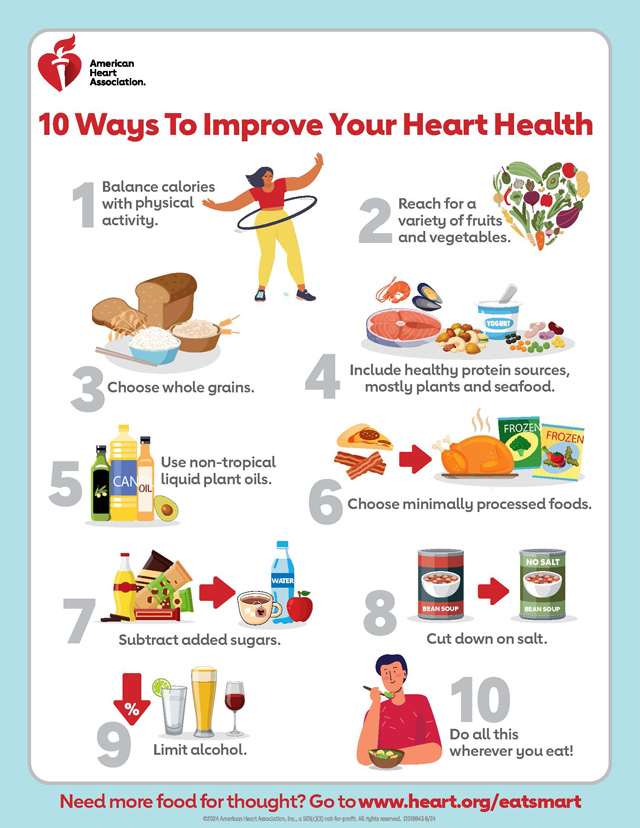Heart health is a crucial aspect of overall well-being, and understanding simple ways to improve heart health can make a significant difference in your life. With the increasing prevalence of heart disease, it is essential to adopt lifestyle changes that promote cardiovascular wellness. In this article, we will explore effective strategies that can help you maintain a healthy heart, including dietary adjustments, physical activity, and stress management techniques.
As you delve deeper into this article, you will discover practical tips that are easy to implement in your daily routine. From incorporating heart-healthy foods into your diet to understanding the importance of regular exercise, each section will provide valuable insights that empower you to take charge of your heart health. Additionally, we will discuss the role of stress reduction and sleep quality in maintaining a strong cardiovascular system.
Whether you are looking to prevent heart disease or simply want to enhance your overall health, this guide will equip you with the knowledge you need. By the end of this article, you will have a comprehensive understanding of how small changes can lead to significant improvements in your heart health. So, keep reading to unlock the secrets to a healthier heart and a more vibrant life!
The Importance of a Balanced Diet
A balanced diet plays a crucial role in maintaining heart health. Consuming a variety of fruits, vegetables, whole grains, and lean proteins can help reduce the risk of heart disease. Foods rich in omega-3 fatty acids, such as salmon and walnuts, are particularly beneficial for heart health. These nutrients help lower blood pressure and reduce inflammation, which are key factors in preventing heart-related issues.
Moreover, reducing the intake of saturated fats, trans fats, and cholesterol can significantly improve heart health. Instead of processed foods, opt for natural sources of fats, such as avocados and olive oil. Incorporating fiber-rich foods can also aid in lowering cholesterol levels, making it essential to include beans, lentils, and oats in your daily meals.
Regular Physical Activity
Engaging in regular physical activity is one of the most effective ways to improve heart health. Aim for at least 150 minutes of moderate aerobic exercise each week, such as brisk walking, cycling, or swimming. Exercise strengthens the heart muscle, improves circulation, and helps maintain a healthy weight, all of which contribute to better cardiovascular health.
In addition to aerobic activities, incorporating strength training exercises at least twice a week can further enhance heart health. Activities like weight lifting or bodyweight exercises help build muscle mass, which can increase metabolism and promote fat loss. Remember, even small changes, like taking the stairs instead of the elevator, can make a significant difference in your overall activity level.
Managing Stress Effectively
Chronic stress can have a detrimental effect on heart health, leading to high blood pressure and increased risk of heart disease. Finding effective ways to manage stress is essential for maintaining a healthy heart. Techniques such as mindfulness meditation, yoga, and deep breathing exercises can help reduce stress levels and promote relaxation.
Additionally, engaging in hobbies and spending time with loved ones can provide emotional support and help alleviate stress. It’s important to recognize the signs of stress and take proactive steps to address them, ensuring that your heart remains healthy and resilient.
Regular Health Check-ups
Regular health check-ups are vital for monitoring heart health. Routine screenings for blood pressure, cholesterol levels, and blood sugar can help identify potential issues before they become serious. Early detection of risk factors allows for timely intervention, which can significantly reduce the likelihood of heart disease.
Moreover, discussing family history and lifestyle choices with your healthcare provider can lead to personalized recommendations for heart health. Keeping track of your health metrics and making necessary adjustments can empower you to take control of your cardiovascular well-being.
The Role of Sleep in Heart Health
Quality sleep is often overlooked but is essential for heart health. Poor sleep patterns can lead to increased stress levels, weight gain, and higher blood pressure, all of which are risk factors for heart disease. Aim for 7-9 hours of quality sleep each night to support overall health and well-being.
Establishing a regular sleep schedule, creating a relaxing bedtime routine, and minimizing screen time before bed can improve sleep quality. Additionally, addressing sleep disorders such as sleep apnea is crucial, as they can significantly impact heart health. Prioritizing sleep is a simple yet effective way to enhance your heart’s health.
| Method | Description |
|---|---|
| Eat a Heart-Healthy Diet | Incorporate fruits, vegetables, whole grains, and lean proteins. Limit saturated fats, trans fats, and sodium. |
| Stay Physically Active | Aim for at least 150 minutes of moderate aerobic activity or 75 minutes of vigorous activity each week. |
| Maintain a Healthy Weight | Achieve and maintain a healthy weight to reduce the risk of heart disease and improve overall health. |
| Quit Smoking | Eliminate tobacco use to significantly lower the risk of heart disease and improve heart health. |
| Limit Alcohol Intake | Consume alcohol in moderation, if at all. This means up to one drink per day for women and two for men. |
| Manage Stress | Practice stress-reducing techniques such as meditation, yoga, or deep breathing exercises to improve heart health. |
| Get Regular Health Screenings | Monitor blood pressure, cholesterol levels, and diabetes to catch potential issues early and manage them effectively. |
| Stay Hydrated | Drink plenty of water throughout the day to maintain optimal bodily functions and support heart health. |



